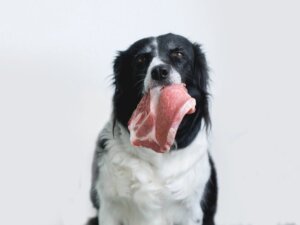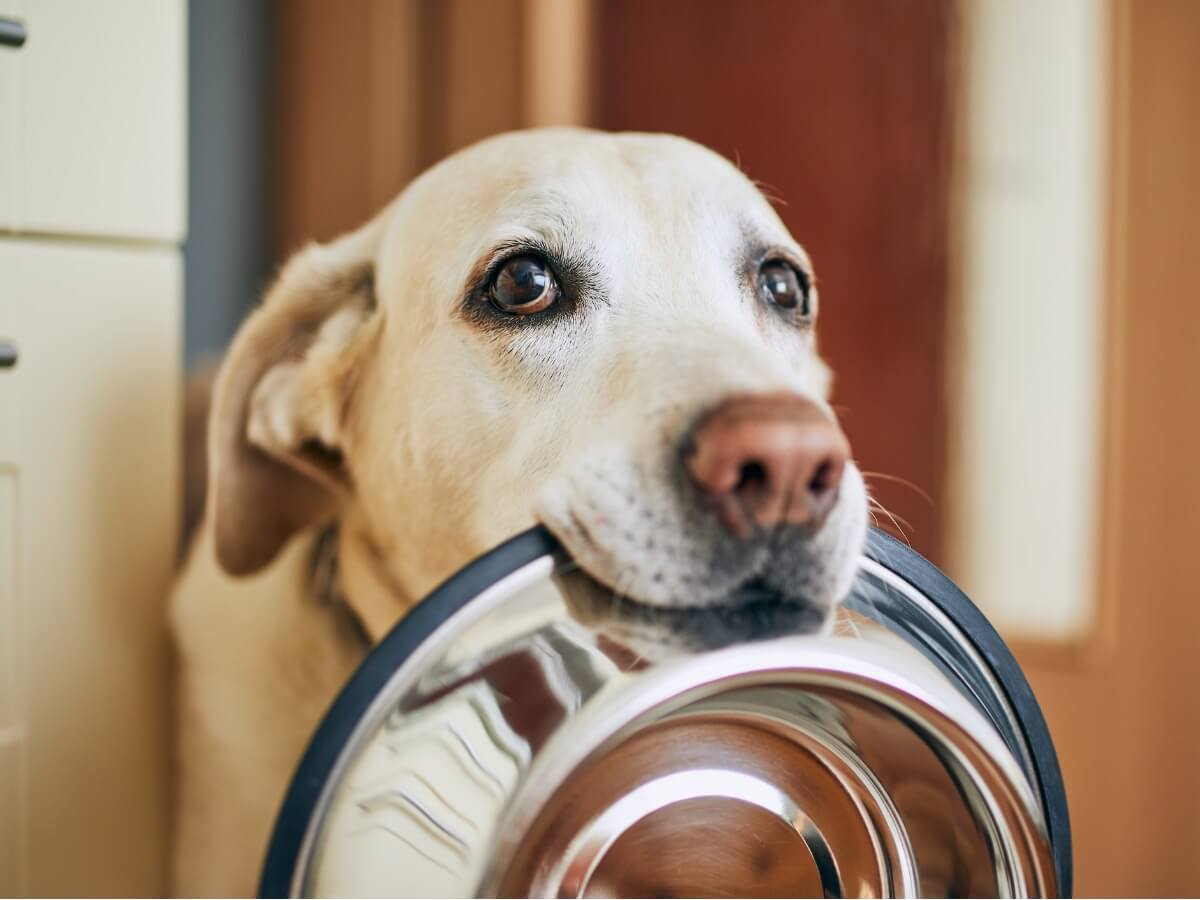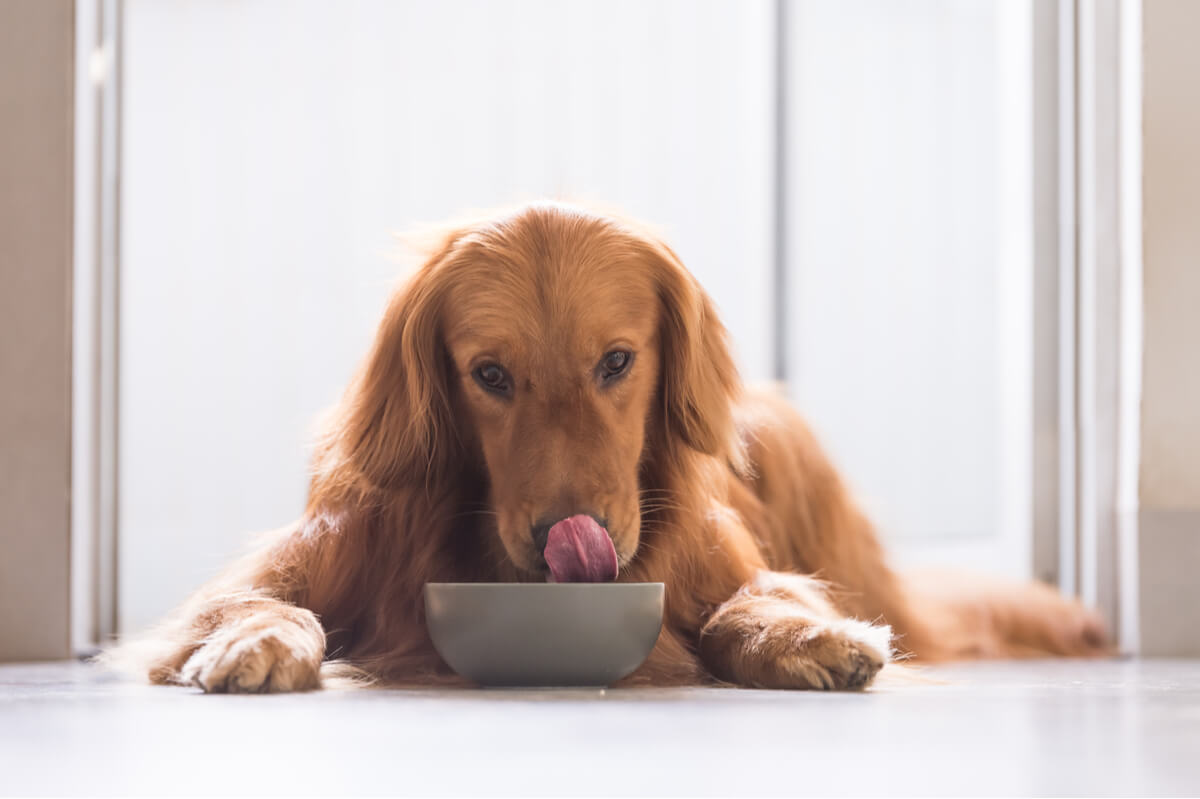Reasons Why Your Dog Shouldn't Eat Barbecued Meat


Written and verified by the biologist Georgelin Espinoza Medina
When we do a barbecue at home, it’s normal for your dog to get excited with the smells of the meats and other food. It’s also normal to want to give them some of the food we cook. However, there are very important reasons why your dog shouldn’t eat barbecued meat – do you know what they are?
We humans love our barbecues, but we often eat food that our dogs shouldn’t eat, because they contain harmful substances for their health. In this article, we’ll explain in detail the reasons why you shouldn’t give these foods to your dog, in order to keep you well-informed and prevent you from falling into the temptation of offering them something harmful.
What foods are part of a barbecue?
Barbecues can vary from country to country, but the most important food we eat at them is meat. This may be beef, pork, lamb, chicken, or even fish and seafood. Sausages are also common.
Meats are cooked over a fire or embers and may be accompanied by soups, salads, sauces, tortillas etc. Besides, it’s usual to enjoy wine, beer and certain other treats to have a great time with family and friends.
Why your dog shouldn’t eat barbecued meat

Although dogs can have a diet based on animal protein, with some carbohydrates, fruits and vegetables, it isn’t a good idea to offer them certain foods that we find at a barbecue. These are the reasons for this.
Salt and seasonings, the first reason why your dog shouldn’t eat barbecued meat
When we do a barbecue, we add salt and various seasonings to the meat, depending on the tastes and customs of each person or locality. The fact of the matter is that some of these substances can be harmful to dogs. At the very least they should be consumed in moderation. Certain spices produce stomach irritations in our pets, causing vomiting, colic, and even diarrhea.
Regarding salt, it should be consumed in controlled doses, since when it’s exceeded in the dog’s diet it can create renal problems, among other severe complications. If one of the condiments used is garlic, the situation becomes more difficult, because it has toxic substances for their body. This food causes anemia, which is detrimental to their health.
Sausages are also salty, spicy and fatty foods that shouldn’t be consumed by our faithful friends.
Excess fat
Another unfavorable point in a barbecue is that it can contain a lot of lipids for our dogs. The excess of oils and fatty cuts isn’t advisable in a nutritious diet. Besides, they create cardiac, liver and pancreas problems, something that can be avoided by offering healthy meals.
Bones also cause damage
In the same way, caution should be taken with bones, as they can cause damage in our pets, especially if they’re small breeds or toy breeds. This is another reason why your dog shouldn’t eat barbecued meat.
Some accompanying foods have toxic substances for dogs
Just as salt and condiments have substances that aren’t suitable for our canine, there are other foods with toxic and harmful elements. Among them we have:
- Onions: These belong to the same group as garlic (Allium), and can also produce anemia in dogs, thanks to its constituent compounds, such as sodium thiosulfate.
- Avocados: These contain a toxic substance called persin, which is present in the seed, also in the leaves and other parts of the plant. If any salad or sauce is prepared with this food during the barbecue, we must be cautious with our pet.
- Chocolate, coffee, soft drinks and sweets: These products, which are very common in human festivities, can be quite harmful for dogs. They contain toxic substances such as methylxanthines, theobromines and caffeines that affect the digestive, cardiac and nervous systems and, at certain doses, can be lethal. In sweets, xylitol is present, which causes low sugar levels in dogs, as well as colorants and other harmful substances.
- Nuts: Although nuts are a good choice as a snack during a barbecue, our pets don’t digest their proteins in the same way as we do. Thus, they cause undesirable intestinal disorders.
- Grapes or raisins: Another very common snack at parties and gatherings. Although humans enjoy this delicacy, they’re toxic for dogs, because they contain substances that cause renal insufficiencies.
- Liquor: Another forbidden food for dogs, as you can imagine – it can affect their nervous system, even in small doses.
Other important contaminants

Another important point to take into account is not to offer raw meat to our pet. This is because it can contain bacteria, such as salmonella, E. coli or listeria bacteria, as well as parasites such as those that cause trichinellosis. Although it’s true that there are dog diets based on uncooked meat products, you must be sure of their quality, in order to prevent diseases.
In the same way, you have to be aware if your pet is allergic to any food, such as wheat. In these cases, you have to take extreme measures if you have those ingredients at your barbecue.
To be specific, although your dog shouldn’t eat barbecued meat, because it may contain harmful ingredients for its health, there are other options that you can share with the during your barbecue.
Choose to prepare some meals that they can eat, give them pieces of well-cooked, lean, unseasoned meats, and have specific treats for them on hand. In this way, your pet will also enjoy those special family moments around the barbecue.
When we do a barbecue at home, it’s normal for your dog to get excited with the smells of the meats and other food. It’s also normal to want to give them some of the food we cook. However, there are very important reasons why your dog shouldn’t eat barbecued meat – do you know what they are?
We humans love our barbecues, but we often eat food that our dogs shouldn’t eat, because they contain harmful substances for their health. In this article, we’ll explain in detail the reasons why you shouldn’t give these foods to your dog, in order to keep you well-informed and prevent you from falling into the temptation of offering them something harmful.
What foods are part of a barbecue?
Barbecues can vary from country to country, but the most important food we eat at them is meat. This may be beef, pork, lamb, chicken, or even fish and seafood. Sausages are also common.
Meats are cooked over a fire or embers and may be accompanied by soups, salads, sauces, tortillas etc. Besides, it’s usual to enjoy wine, beer and certain other treats to have a great time with family and friends.
Why your dog shouldn’t eat barbecued meat

Although dogs can have a diet based on animal protein, with some carbohydrates, fruits and vegetables, it isn’t a good idea to offer them certain foods that we find at a barbecue. These are the reasons for this.
Salt and seasonings, the first reason why your dog shouldn’t eat barbecued meat
When we do a barbecue, we add salt and various seasonings to the meat, depending on the tastes and customs of each person or locality. The fact of the matter is that some of these substances can be harmful to dogs. At the very least they should be consumed in moderation. Certain spices produce stomach irritations in our pets, causing vomiting, colic, and even diarrhea.
Regarding salt, it should be consumed in controlled doses, since when it’s exceeded in the dog’s diet it can create renal problems, among other severe complications. If one of the condiments used is garlic, the situation becomes more difficult, because it has toxic substances for their body. This food causes anemia, which is detrimental to their health.
Sausages are also salty, spicy and fatty foods that shouldn’t be consumed by our faithful friends.
Excess fat
Another unfavorable point in a barbecue is that it can contain a lot of lipids for our dogs. The excess of oils and fatty cuts isn’t advisable in a nutritious diet. Besides, they create cardiac, liver and pancreas problems, something that can be avoided by offering healthy meals.
Bones also cause damage
In the same way, caution should be taken with bones, as they can cause damage in our pets, especially if they’re small breeds or toy breeds. This is another reason why your dog shouldn’t eat barbecued meat.
Some accompanying foods have toxic substances for dogs
Just as salt and condiments have substances that aren’t suitable for our canine, there are other foods with toxic and harmful elements. Among them we have:
- Onions: These belong to the same group as garlic (Allium), and can also produce anemia in dogs, thanks to its constituent compounds, such as sodium thiosulfate.
- Avocados: These contain a toxic substance called persin, which is present in the seed, also in the leaves and other parts of the plant. If any salad or sauce is prepared with this food during the barbecue, we must be cautious with our pet.
- Chocolate, coffee, soft drinks and sweets: These products, which are very common in human festivities, can be quite harmful for dogs. They contain toxic substances such as methylxanthines, theobromines and caffeines that affect the digestive, cardiac and nervous systems and, at certain doses, can be lethal. In sweets, xylitol is present, which causes low sugar levels in dogs, as well as colorants and other harmful substances.
- Nuts: Although nuts are a good choice as a snack during a barbecue, our pets don’t digest their proteins in the same way as we do. Thus, they cause undesirable intestinal disorders.
- Grapes or raisins: Another very common snack at parties and gatherings. Although humans enjoy this delicacy, they’re toxic for dogs, because they contain substances that cause renal insufficiencies.
- Liquor: Another forbidden food for dogs, as you can imagine – it can affect their nervous system, even in small doses.
Other important contaminants

Another important point to take into account is not to offer raw meat to our pet. This is because it can contain bacteria, such as salmonella, E. coli or listeria bacteria, as well as parasites such as those that cause trichinellosis. Although it’s true that there are dog diets based on uncooked meat products, you must be sure of their quality, in order to prevent diseases.
In the same way, you have to be aware if your pet is allergic to any food, such as wheat. In these cases, you have to take extreme measures if you have those ingredients at your barbecue.
To be specific, although your dog shouldn’t eat barbecued meat, because it may contain harmful ingredients for its health, there are other options that you can share with the during your barbecue.
Choose to prepare some meals that they can eat, give them pieces of well-cooked, lean, unseasoned meats, and have specific treats for them on hand. In this way, your pet will also enjoy those special family moments around the barbecue.
All cited sources were thoroughly reviewed by our team to ensure their quality, reliability, currency, and validity. The bibliography of this article was considered reliable and of academic or scientific accuracy.
- Gugler, K., Piscitelli, C., & Dennis, J. (2013). Hidden dauger in the kitchen: common foods toxic to dogs and cats. Compendium, continuing Education for Veterinarians. https://vetfolio.s3.amazonaws.com/32/8b/ccb316ed402ba0bae018194361f6/clinical-view-39-hidden-dangers-in-the-kitchen-common-foods-toxic-to-dogs-and-cats.pdf
- Kovalkovičová, N., Sutiaková, I., & Šutiak, V. (2009). Some food toxic for pets. Interdisciplinary Toxicology, 2(3), 169–176.
- Ortega, M. (2017). Triquinelosis. Ciencia, 68(1), 74-77.
- Salgado, B., Monteiro, L., & Rocha, N. (2011). Allium species poisoning in dogs and cats. The Journal of Venomous Animals and Toxins including Tropical Diseases, 17(1), 4-11.
- Sillero, M. (2019). Mitos y dietas alternativas en perros y gatos. Revisión sobre sus efectos y recomendaciones. [Tesis de grado, Universidad Católica de Valencia]. https://riucv.ucv.es/bitstream/handle/20.500.12466/58/Mara_Sillero_Vizcaino_pdf.pdf?sequence=5
This text is provided for informational purposes only and does not replace consultation with a professional. If in doubt, consult your specialist.








